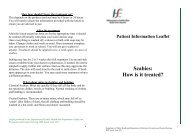national guidelines on the management of outbreaks of norovirus ...
national guidelines on the management of outbreaks of norovirus ...
national guidelines on the management of outbreaks of norovirus ...
Create successful ePaper yourself
Turn your PDF publications into a flip-book with our unique Google optimized e-Paper software.
Nati<strong>on</strong>al Guidelines <strong>on</strong> <strong>the</strong> Management <strong>of</strong> Outbreaks <strong>of</strong> Norovirus Infecti<strong>on</strong> in Healthcare Settings NDSC<br />
3.5 Resp<strong>on</strong>se to an Outbreak<br />
3.5.1. Early Communicati<strong>on</strong><br />
Early communicati<strong>on</strong> is vital in c<strong>on</strong>trolling <strong>the</strong> spread <strong>of</strong> infecti<strong>on</strong> (see secti<strong>on</strong> 5). The following should be<br />
notified as so<strong>on</strong> as possible:<br />
• Senior staff (C<strong>on</strong>sultant Medical Staff, Senior Nursing pers<strong>on</strong>nel, Paramedical staff).<br />
• CEO/ Health Board/General Manager.<br />
• Regi<strong>on</strong>al DPH.<br />
• Press/ communicati<strong>on</strong>s <strong>of</strong>ficer <strong>of</strong> <strong>the</strong> Health Board.<br />
3.5.2. Early C<strong>on</strong>trol Measures<br />
A. Immediate cleaning and envir<strong>on</strong>mental dec<strong>on</strong>taminati<strong>on</strong><br />
B. Scrupulous handwashing<br />
C. Segregati<strong>on</strong> <strong>of</strong> those who are ill from those who are not<br />
D. Limitati<strong>on</strong> <strong>of</strong> movement <strong>of</strong> staff and patients<br />
E. Exclusi<strong>on</strong> <strong>of</strong> any ill staff from work for 48 hours after <strong>the</strong>ir last episode <strong>of</strong> vomiting or<br />
diarrhoea<br />
F. Sensible <strong>management</strong> <strong>of</strong> visiting<br />
A. Immediate cleaning and envir<strong>on</strong>mental dec<strong>on</strong>taminati<strong>on</strong><br />
Immediate cleaning and dec<strong>on</strong>taminati<strong>on</strong> <strong>of</strong> soiling due to vomiting and diarrhoea is vital in c<strong>on</strong>trolling <strong>the</strong><br />
spread <strong>of</strong> <strong>norovirus</strong> infecti<strong>on</strong>. In additi<strong>on</strong>, as so<strong>on</strong> as an area or unit has an outbreak, <strong>the</strong> frequency <strong>of</strong><br />
cleaning <strong>of</strong> <strong>the</strong> affected area must be increased to twice daily. Senior hospital <strong>management</strong> should ensure<br />
that this policy is enforced. The l<strong>on</strong>ger this cleaning is delayed, <strong>the</strong> greater is <strong>the</strong> danger that <strong>the</strong> virus may<br />
spread and infect o<strong>the</strong>r patients and staff. It is essential that those resp<strong>on</strong>sible for cleaning and<br />
dec<strong>on</strong>taminati<strong>on</strong> have adequate protective clothing and equipment in order to minimise <strong>the</strong> possibility <strong>of</strong><br />
spread am<strong>on</strong>gst <strong>the</strong>mselves and o<strong>the</strong>r members <strong>of</strong> staff (Box 3). They must not be food handlers.<br />
B. Handwashing<br />
Currently, <strong>the</strong> interventi<strong>on</strong> that has been shown to be most effective at c<strong>on</strong>trolling infectious intestinal disease<br />
is scrupulous handwashing. Frequent hand washing with warm water and soap for at least 10 sec<strong>on</strong>ds is<br />
<strong>the</strong> most effective way <strong>of</strong> limiting pers<strong>on</strong>-to-pers<strong>on</strong> spread <strong>of</strong> infecti<strong>on</strong>.<br />
There should be a written handwashing policy in all healthcare settings/facilities – reinforcing this will be<br />
central to preventing and c<strong>on</strong>trolling <strong>outbreaks</strong>. Emphasis should be placed up<strong>on</strong> <strong>the</strong> need for staff to wash<br />
<strong>the</strong>ir hands, particularly after using <strong>the</strong> toilet, before preparing or eating food and prior to and following all<br />
patient and specimen c<strong>on</strong>tact.<br />
C. Segregati<strong>on</strong> <strong>of</strong> those who are ill from those who are not<br />
C<strong>on</strong>siderable evidence exists to indicate that segregating those who are ill from those who are not can be<br />
effective at reducing <strong>the</strong> risk <strong>of</strong> spread <strong>of</strong> infecti<strong>on</strong> to o<strong>the</strong>r areas <strong>of</strong> <strong>the</strong> hospital. Where possible<br />
symptomatic patients should be nursed in isolati<strong>on</strong>, o<strong>the</strong>rwise <strong>the</strong>y should be cohorted.<br />
D. Limitati<strong>on</strong> <strong>of</strong> movement <strong>of</strong> staff and patients<br />
Similarly, restricting <strong>the</strong> movement <strong>of</strong> those who are ill, or those who may be incubating illness can reduce<br />
<strong>the</strong> likelihood <strong>of</strong> spread. It is important to minimise <strong>the</strong> circulati<strong>on</strong> <strong>of</strong> staff between affected and unaffected<br />
areas. Unaffected patients or c<strong>on</strong>valescing patients (those who have not vomited or had diarrhoea in <strong>the</strong><br />
Norovirus in Healthcare Settings - Page 8 -






